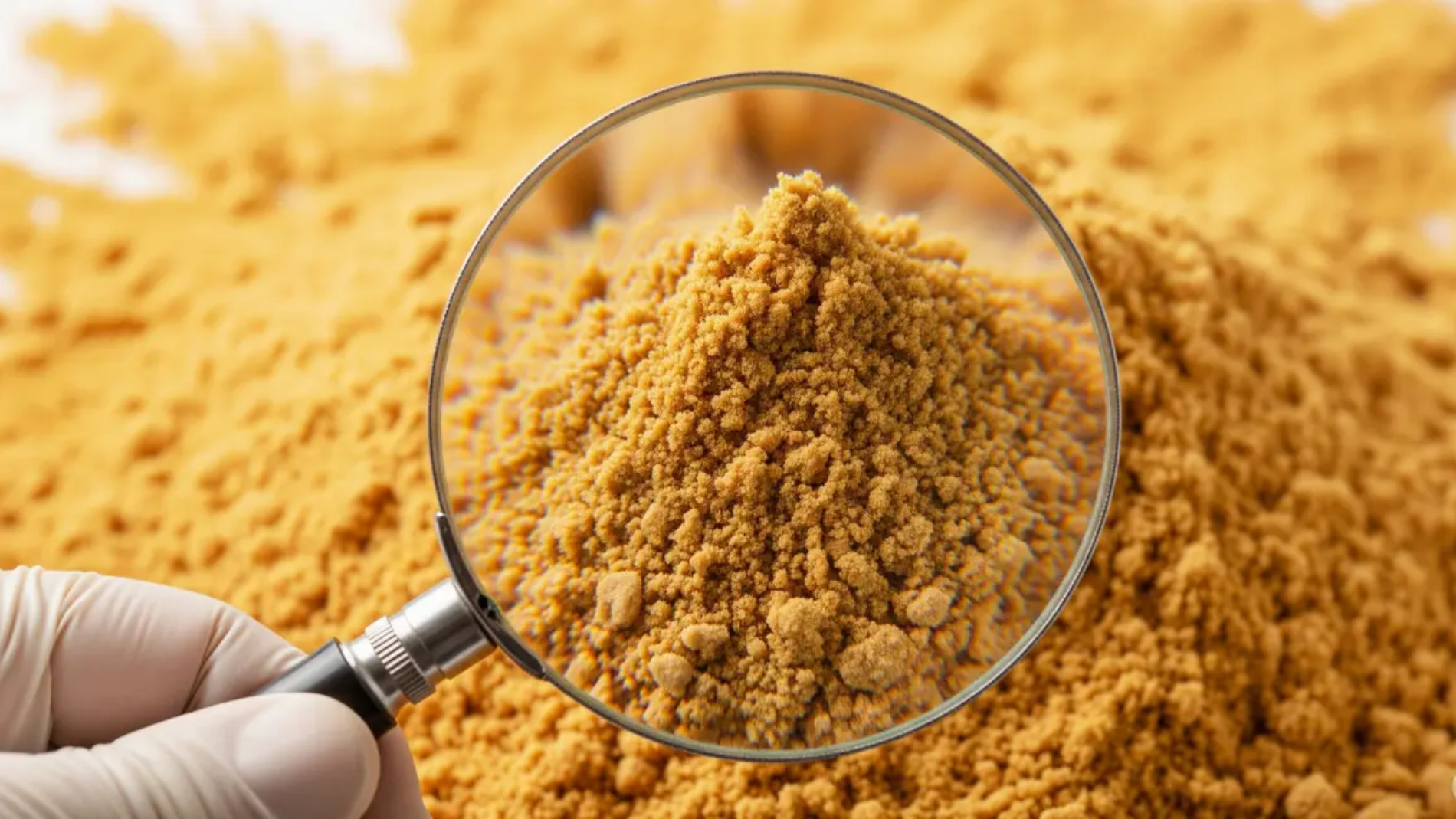In the world of food manufacturing and industrial spice blending, precision is everything. A slight variation in the texture of an ingredient can alter the mouthfeel of a sauce, the visual appeal of a soup, or the flowability of a dry rub. While many buyers simply search for “onion powder,” experienced procurement managers know that this category is actually a spectrum. Understanding the different types of onion powder based on their particle size—or “mesh size”—is the secret to creating a consistent, high-quality product.
When sourcing bulk onion products from India, you aren’t just buying flavor; you are buying texture, rehydration capability, and visual impact. Whether you are formulating a ready-to-eat meal or a delicate seasoning blend, choosing the correct cut is critical.
This guide breaks down the technical differences between the five main dehydrated onion formats, helping you select the perfect ingredient for your production line.
The Potency Factor: Why Curcumin Content Matters for Skin
Before diving into the specific products, it is important to understand “Mesh.” In the food industry, mesh size refers to the number of openings in one linear inch of a screen.
Low Mesh Number (e.g., 5-10 Mesh): Indicates large openings, resulting in larger particles or flakes.
High Mesh Number (e.g., 80-100 Mesh): Indicates tiny openings, resulting in a fine, flour-like powder.
The mesh size determines how quickly the onion rehydrates, how potent the immediate flavor release is, and how the ingredient disperses within a mix.
1. Dehydrated White Onion Kibbled (The Largest Cut)
At the top of the size spectrum is Dehydrated White Onion Kibbled. These are not powders; they are recognizable flakes of onion. Typically ranging from 10 to 25 mm, kibbled onions are produced by slicing the fresh bulb and dehydrating it without heavy grinding.
Best Applications: This format is ideal for applications where visual appeal is just as important as flavor. It is the standard choice for instant noodle tastemakers, wet soups, and ready-to-cook curry kits.
Why Choose It: When rehydrated, kibbled onion regains the texture of chopped fresh onion, providing a “homestyle” feel to industrial food products.
Spice Up Your Business with Authentic Indian Flavors
Import and Export Excellence from India!

2. Dehydrated White Onion Chopped (The Versatile Chunk)
Slightly smaller than kibbled, Dehydrated White Onion Chopped offers a more uniform, square-cut appearance, usually ranging between 3 to 5 mm. This size is engineered for consistency.
Best Applications: This is a favorite for canned salsas, meat rubs, and burger patties. In processed meats, the chopped onion absorbs moisture during cooking, keeping the meat juicy while adding a distinct savory bite.
Why Choose It: It bridges the gap between a large flake and a small granule. It offers a definite “bite” without being overwhelming, making it perfect for chunky sauces and stews.
3. Dehydrated White Onion Minced (The Texture Enhancer)
Moving down the scale, we find Dehydrated White Onion Minced. Typically spanning 1 to 3 mm, minced onion looks like coarse sand or tiny chips. This is one of the most popular types of onion powder alternatives for dry mixes.
Best Applications: Minced onion is widely used in salad dressings, dips (like ranch), and bottled sauces. It is small enough to pass through dispensing nozzles but large enough to provide a pleasant textural contrast in creamy formulations.
Why Choose It: It rehydrates quickly compared to kibbled or chopped onions but retains enough structure to be visible to the consumer, adding perceived value to the product.
4. Dehydrated White Onion Granules (The Free-Flowing Champion)
Dehydrated White Onion Granules usually fall within the 40 to 60 mesh range. To the naked eye, this looks like a coarse, gritty powder (similar to cornmeal).
Best Applications: This is the king of dry seasoning blends and spice rubs.
Why Choose It: The primary advantage of granules over fine powder is flowability. Fine powders can clump in humid environments or clog industrial hoppers. Granules remain free-flowing and mix evenly with other coarse spices like cracked black pepper and kosher salt, ensuring a uniform distribution of flavor in every shake.
5. Dehydrated White Onion Powder (The Flavor Powerhouse)
Finally, we arrive at the product most people are familiar with: Dehydrated White Onion Powder. This is ground to a fine dust, typically between 80 to 100 mesh.
Best Applications: This format is essential for chips/snack coatings, smooth sauces, gravies, and marinades.
Why Choose It: When you need instant flavor dispersion without any texture, fine powder is the only choice. It dissolves almost immediately in liquid and adheres perfectly to snacks like popcorn or potato chips. It provides the highest surface area, meaning the flavor hit is immediate and potent.
Spice Up Your Business with Authentic Indian Flavors
Import and Export Excellence from India!

Choosing the Right Partner for Your Specifications
Navigating the different types of onion powder and dehydrated cuts can be complex. A generic supplier might simply sell you “onion,” but a strategic partner will ask about your mesh requirements.
Whether your formulation requires the visual chunkiness of Dehydrated White Onion Kibbled or the instant solubility of Dehydrated White Onion Powder, ensuring you get the exact particle size is crucial for your product’s consistency. By understanding these distinctions, you can optimize your manufacturing process, reduce waste, and deliver a superior food product to your customers.
Frequently Asked Questions (FAQs)
1. What is the difference between minced onion and onion granules?
The main difference is size and texture. Minced onion (1-3mm) creates visible specks and a chewy texture when rehydrated. Onion granules (40-60 mesh) are smaller, sand-like, and are used primarily for flavor distribution in dry rubs without adding significant texture.
2. Which onion powder type is best for spice blends?
Dehydrated White Onion Granules are generally preferred for spice blends. They flow better than fine powder and don’t clump as easily, ensuring a consistent mix in glass jars or shakers.
3. Does mesh size affect the flavor intensity?
Yes. Fine Dehydrated White Onion Powder has a larger surface area relative to its volume, which often results in a more immediate, intense burst of flavor compared to larger cuts like kibbled onion, which release flavor more slowly.
4. Can I substitute chopped onion for kibbled onion?
Yes, in most wet applications like soups or stews, they are interchangeable. However, Dehydrated White Onion Kibbled will provide larger, more rustic pieces, while chopped onion will be more uniform and smaller.
5. How do I prevent onion powder from clumping?
Clumping is caused by moisture absorption. Store your powder in a cool, dry place. For industrial use, consider using Dehydrated White Onion Granules instead of fine powder, as they are naturally more resistant to caking.
6. What is the standard shelf life of dehydrated onion products?
When stored correctly in air-tight, moisture-proof packaging, all types—from kibbled to powder—typically have a shelf life of 12 to 24 months.
7. Why is white onion preferred for dehydration over red onion?
White onions generally have a higher solid content and a sharper, more desirable pungency for processing. Dehydrated White Onion Powder also has a neutral color that doesn’t darken or discolor food products like red onion might.
8. Do all these types come from the same onion?
Yes. Whether it is kibbled, minced, or powdered, they all start from the same raw material (usually high-quality Indian white onions). The difference lies solely in the cutting, drying, and grinding processes.
About us
We bridge the gap between local producers and global markets, ensuring seamless trade facilitation with exceptional quality and reliability. We provide quick delivery services with customized packaging with all approval of International Certificates (Spices board India, MSME, IEC, fssai, FIEO, APEDA, EU certification, FDA and Many More)
Contact us
Shop No. 3, Ganesh Prestige Sr. No. 2/15, Near Laxmi Jewellers, Dhanakawadi, Pune – 411043, Maharashtra INDIA.
Call On
+91 9545205050
+91 9822422584



Leave A Comment